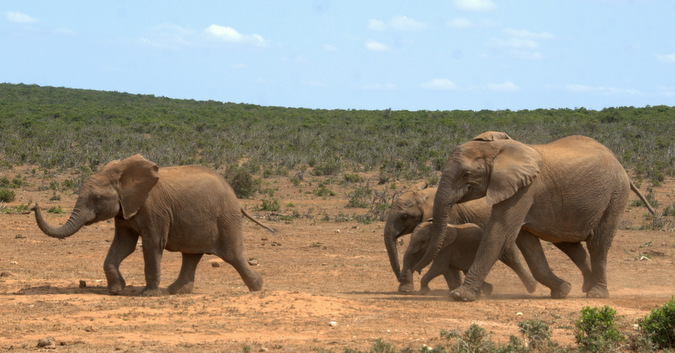Elephants can run at speeds of up to 25 miles per hour. This speed is impressive given their massive size.
Elephants are the largest land animals on Earth. Despite their size, they are surprisingly agile and capable of quick bursts of speed. Elephants use this speed primarily for short distances, especially when threatened or excited. Their running technique is unique, as they keep at least two feet on the ground at all times.
This helps them maintain balance and avoid injury. Understanding their running ability gives us insight into their behavior and physical capabilities. Whether in the wild or in conservation areas, these gentle giants continue to amaze us with their strength and agility. Their speed is just one of the many fascinating aspects of these magnificent creatures.

Credit: www.youtube.com
Elephant Anatomy And Physiology
Elephants are known for their massive size and strength. Their anatomy and physiology play a crucial role in their ability to run. Understanding the muscular structure and skeletal framework of elephants can help explain how fast they can move.
Muscular Structure
Elephants have strong, large muscles. These muscles support their massive bodies. The muscles in their legs are particularly robust. This strength helps them move quickly when needed.
Elephants have two types of muscle fibers. Fast-twitch fibers help with short bursts of speed. Slow-twitch fibers help with endurance. Both types are important for their movement.
Skeletal Framework
The skeletal framework of elephants is unique. Their bones are dense and strong. This structure supports their heavy weight.
Elephants have large, pillar-like legs. These legs act like columns, providing stability. Their joints are designed to handle the stress of their weight.
Their feet are also special. They have a large, cushioned pad that absorbs shock. This helps them move smoothly and reduces injury.
Speed Variations Among Elephant Species
Elephants are known for their size and strength. But did you know they can also run? The speed of an elephant varies between species. Let’s explore how fast African and Asian elephants can run.
African Elephants
African elephants are the largest land animals on Earth. Despite their size, they can run quite fast. On average, an African elephant can run at speeds of up to 25 miles per hour (40 kilometers per hour). This speed helps them escape predators and travel quickly across the savannah.
- Size: Larger than Asian elephants
- Weight: Up to 14,000 pounds
- Speed: Up to 25 miles per hour
African elephants have larger ears, which help them cool down while running. Their powerful legs and strong muscles support their speed and agility.
Asian Elephants
Asian elephants are smaller than their African cousins. They also run at different speeds. On average, an Asian elephant can run at speeds of up to 15 miles per hour (24 kilometers per hour). While not as fast as African elephants, they are still impressive runners.
- Size: Smaller than African elephants
- Weight: Up to 11,000 pounds
- Speed: Up to 15 miles per hour
Asian elephants have smaller ears compared to African elephants. This might affect their ability to cool down while running. Their legs and muscles are also strong, enabling them to move quickly when needed.
| Elephant Species | Average Speed (mph) | Weight (pounds) |
|---|---|---|
| African Elephant | 25 | Up to 14,000 |
| Asian Elephant | 15 | Up to 11,000 |
Factors Influencing Elephant Speed
Elephants are majestic creatures known for their size and strength. But how fast can these gentle giants run? Several factors influence an elephant’s speed. Let’s explore these factors in detail.
Age And Size
Young elephants are generally more agile than older ones. They can run faster due to their smaller size and lighter weight. Older elephants, being larger and heavier, tend to be slower. Size plays a crucial role in speed. Smaller elephants can move quickly, while larger ones are slower due to more mass.
Health And Fitness
Healthy elephants can run faster than those with health issues. Fitness levels significantly affect speed. Elephants with good muscle tone and stamina can run faster. Injuries or illnesses slow them down, making it harder to move quickly. Nutrition also impacts speed. Well-fed elephants have more energy and can sustain higher speeds.
Comparative Analysis With Other Animals
Understanding how fast elephants can run is fascinating. It’s even more interesting when we compare their speed with other animals. This section dives into a comparative analysis with other animals, focusing on land mammals and large herbivores.
Land Mammals
Elephants are not the fastest land mammals. They can reach speeds of up to 25 kilometers per hour (15.5 miles per hour). Let’s compare this speed with other land mammals:
- Cheetah: The fastest land animal, running at 120 kilometers per hour (75 miles per hour).
- Lion: Can sprint up to 80 kilometers per hour (50 miles per hour).
- Zebra: Can run at speeds of 65 kilometers per hour (40 miles per hour).
Elephants are slower than many other land mammals. Their large size and weight limit their speed.
Large Herbivores
Comparing elephants with other large herbivores reveals interesting insights. Here’s a table showcasing their speeds:
| Animal | Speed (km/h) | Speed (mph) |
|---|---|---|
| Elephant | 25 | 15.5 |
| Rhinoceros | 50 | 31 |
| Hippopotamus | 30 | 19 |
| Giraffe | 60 | 37 |
Elephants are slower than most large herbivores. Giraffes and rhinos can run much faster.
Despite their slower speed, elephants have other survival skills. Their intelligence and social structures are key to their survival.
Implications Of Elephant Speed
Understanding how fast elephants can run has several important implications. It affects their survival, their interactions with humans, and the ecosystem. Let’s explore these implications in detail.
Predator Evasion
Elephants can run up to 25 km/h (15.5 mph). This speed is crucial for escaping predators. Even though adult elephants have few natural predators, young elephants are at risk. Lions and hyenas often target young or sick elephants. The ability to run fast helps them evade these threats.
Elephants rely on their size and speed to deter predators. A charging elephant can scare away even the bravest lion. This makes their speed a key factor in their survival strategy.
Human-elephant Interactions
Elephants sometimes encounter humans in the wild or near villages. Fast-moving elephants can be dangerous in these situations. Understanding their speed helps in planning safer human-elephant interactions.
Conservationists use this knowledge to create better wildlife corridors. These corridors ensure elephants have safe passage without disrupting human activities. Knowing how fast they can run also helps in emergencies. It allows quick action to avoid human-elephant conflicts.
Farmers near elephant habitats must be aware of their speed. This awareness helps in taking timely precautions to protect crops and property. It’s essential for both human and elephant safety.

Credit: rangerrick.org

Credit: africageographic.com
Frequently Asked Questions
How Fast Can An Elephant Run?
Elephants can run at speeds up to 25 mph. However, they typically move at slower speeds to conserve energy.
Can Elephants Run Faster Than Humans?
Yes, elephants can run faster than humans. While humans can sprint up to 28 mph, elephants can sustain their top speed longer.
How Do Elephants Run?
Elephants run using a gait called a “grounded run. ” They keep at least one foot on the ground at all times.
Do Baby Elephants Run Faster Than Adults?
No, baby elephants do not run faster than adults. They are slower and less coordinated compared to fully grown elephants.
Conclusion
Understanding how fast elephants can run is fascinating. These gentle giants can reach speeds of up to 25 mph. Despite their size, they are surprisingly agile. Knowing their speed helps us appreciate their physical capabilities. Respect and protection for these majestic creatures are crucial for their survival.
